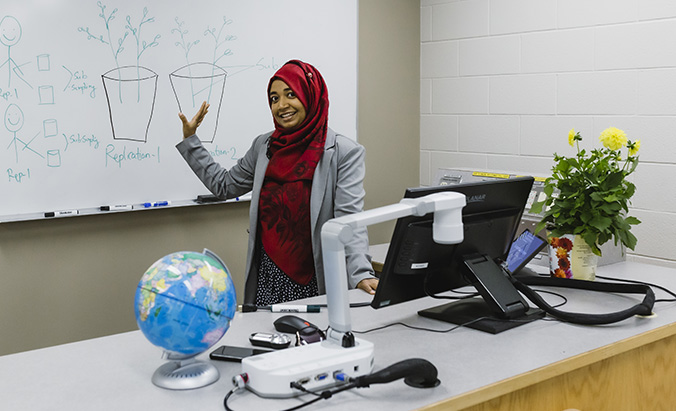
New AgBio class teaches valuable communications skills
AGRC 110 class offers lectures covering several different topics ranging from data visualization to writing and editing.
By Jane CaulfieldResearchers and agricultural professionals spend hours toiling over experiments or developing products and services that can lead to meaningful solutions to real world problems, such as food insecurity and climate change. But being able to communicate the work being done, in academia and beyond, is the key to seeing those solutions put into action through applied practice – and communication is a skill that can be cultivated. That’s why the College of Agriculture and Bioresources at the University of Saskatchewan (USask) developed the 100-level class, Scientific Literacy and Communication for the Agricultural Sciences.
“It provides a really important foundation for several aspects of their student life and future professional agrology careers,” said Dr. Sirajum Munira (PhD), who was the first lecturer to teach the course in the 2021/22 academic year. “Students are provided with an opportunity to enhance their scientific literacy and learn how to better communicate their work with the lay public.”
While students major in several areas of agricultural expertise and science, this class specifically aims to help them develop soft skills such as presentation styles and writing for various audiences. It provides students with a chance to build the confidence they need to establish a voice for themselves in academic and practical conversations in a meaningful way and help them build a foundation for a successful career in agriculture.
“We put a lot of emphasis on our specialized courses, such as chemistry and biology, but less emphasis on effective communication skills. That’s another reason to introduce this course at the early stages of their university life. As instructors, we have the scope to prepare our students on how to communicate with scientists as well as non-scientists, and knowing how to talk to both is important.”
A good mix of classroom learning and knowledge application
The class itself consists of lectures and supplemental tutorial hours each week, providing students opportunities to learn new concepts and theories while simultaneously practice their application in a safe environment. Weekly topics include, but are not limited to, scientific communication methods in agriculture, critical thinking, data management and visualization.
“I have a module on professional development and agrology practices in Canada. Students liked that module and their professional development assignment,” said Munira. “It helps them to think critically about their future career option and pathways.”
Over the course of one term, students develop several skills that will enhance their careers and professional ethics, learning directly from their instructor, and in upcoming course offerings, as well as leading industry experts as guest speakers. Assignments throughout the course include writing mini-scientific papers, a data management and visualization exercise, an oral presentation on a current agricultural topic of their choice, and a final scientific poster group project.
“By providing students with the opportunity to choose the topics they are interested in, they can be more engaged in the activities. We’ve gotten some good feedback from the first cohort. The choice was one thing they said they appreciated.”
Munira adds that students also appreciated how the class provides opportunities to ask questions and learn about issues that may not come up in other classes.
“We talk a lot about what is happening in global agricultural communications and what that means for the future of our industry, such as sustainable agriculture and enhancing inclusivity into the industry. The result is that students learn how to be compassionate and generous to their classmates and future colleagues, which can lead to better experiences for everyone involved.”

A personal interest in communication
Working out of both the Departments of Soil Science and Plant Sciences, Munira said she’s always recognized that good communications skills are part of good research.
“Since my childhood, I had a special interest in developing communication skills. It takes time to develop them and with practice it gets more comfortable. I am so excited about teaching this course. I hope my passion and work experience in agriculture will help students increase their knowledge and improve their scientific communication skills in agriculture, in academia, and beyond academia.”
Munira earned her bachelors in agrotechnology from Khulna University and masters in horticulture from Bangabandhu Sheikh Mujibur Rahman Agricultural University, both located in Bangladesh. She then moved to Canada to attend the University of Manitoba where she earned her PhD in Environmental Soil Science.
Munira highlights the issue of misinformation spread through social media and says that classes like this help students understand how it happens, why it happens, and how they can help create positive change.
“In my classroom they have an opportunity to talk through several issues that impact them now and will impact their future careers. They learn how to tell the stories of new science-based knowledge so that lay people can understand it.”
Moving forward
While the class was first taught in the 2021/22 academic year, it is now required for incoming AgBio undergraduate students. After the first term, students were asked to participate in an in-depth evaluation to ensure the course continues to cover topics that are responsive to both industry and student needs.
“We had fourteen students in the first year, ranging from first year to fourth,” said Munira. “They provided really helpful feedback regarding what they liked as well as areas they recognize as in need of improvement.”
This kind of evaluation will be relevant each year to ensure the class remains relevant, ensuring the maximum learning potential.
“I look forward to teaching AGRC 110 to prepare my students as great global ag communicators, especially since the definition of a community is changing away from local-only perspectives. I hope to help develop lifelong learners, bridge the gap between society and science, and also mitigate the risks and challenges the ag community of our province, our country, and the planet is facing right now, and help build healthy communities for future generations.”
Agknowledge, Fall 2022

